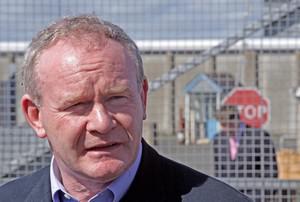The Troubles & the transformationMartin McGuinness: the IRA commander who walked down a political path
Martin McGuinness, 66, died on 21 March 2017. He suffered from amyloidosis, a rare disease which attacks the body’s vital organs. In 1998, Martin McGuinness, a former commander in the Irish Republican Army (IRA), joined Reverend Ian Paisley, the firebrand Protestant leader, to support and implement the Good Friday Agreement, which brought power sharing to the governing of Northern Ireland. Many nationalists accused Paisley of instigating the Troubles by orchestrating opposition to the civil rights movement. Many unionists refused to forgive McGuinness’s role in IRA violence. For victims of violence on either side of the conflict, the focus on the past is understandable, and it is also true that there were voices on both sides of the divide who, from the outset, consistently argued for a more peaceful way toward change in Northern Ireland. Ultimately, however, figures such as McGuinness and Paisley both helped lead more intransigent minds down that political path. As long as future generations are prepared to continue with the same endeavor, the most enduring legacy of the former firebrand preacher and the former IRA commander will be a peaceful, just, and democratic settlement in Ireland.

Martin McGuiness in 2011 // Source: theconversation.com
During the Troubles in Northern Ireland, some Ulster unionists blamed the Catholic education system for promoting an Irish nationalist identity among the minority population. This, they argued, helped fuel a republican insurgency from the early 1970s. As a leading figure in the insurgency, Martin McGuinness was unequivocal when asked about his own experience of being taught in the Catholic system: “They didn’t make me a republican; the Brits made me a republican.”
It was not Irish history that politicized McGuinness and led him to join the Irish Republican Army (IRA). Rather events in Northern Ireland from the late 1960s drove him – specifically the state’s violent response to a civil rights movement calling for an end to Catholic discrimination, and in particular seeing the killing of a neighbour by the British army in July 1971.
Henceforth, McGuinness became a committed IRA member. He gained a particular reputation as a deadly sniper. Young Catholic women in his home town of Derry would even goad the British soldiers who supervised their every movement on the streets: “McGuinness will be out tonight. McGuinness will be out tonight …” McGuinness was also feared within republicanism as a strict disciplinarian, foreswearing alcohol and other vices, and appearing cold and unemotional towards the movement’s brutal response to “touts” – those suspected of collaborating with the security forces.
However, McGuinness’ abilities early marked him out as more than just a military man. Aged just 22, he was airlifted to London as part of an IRA delegation to engage in talks with the British government. Though these talks failed, when the British reopened a channel of communication with republicans in the late 1980s, McGuinness was now lead negotiator for Sinn Féin, the political wing of the IRA.
